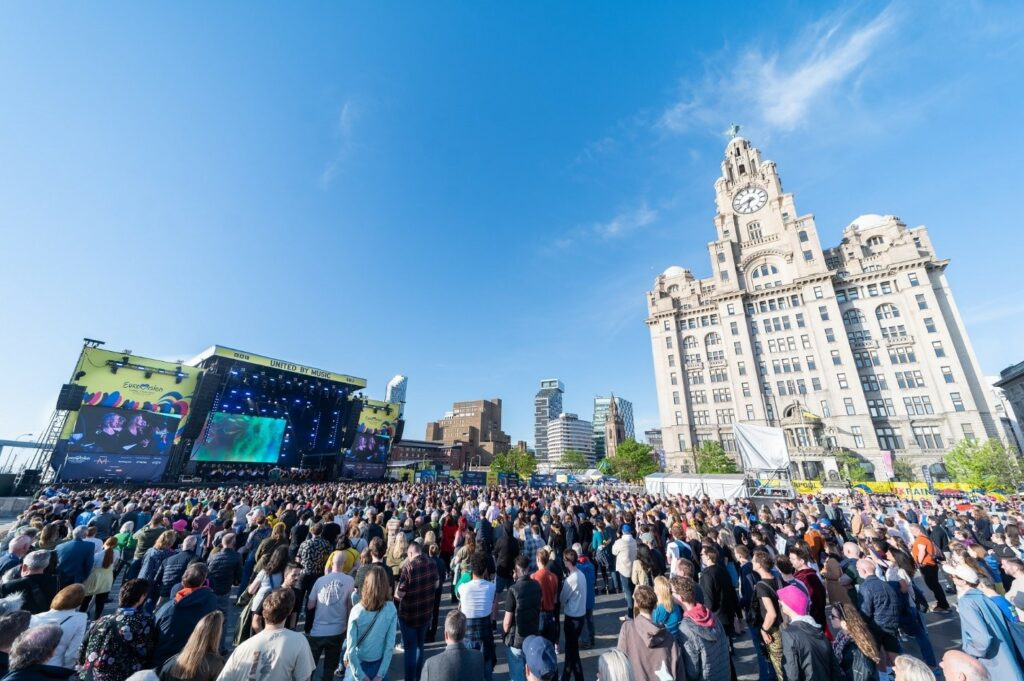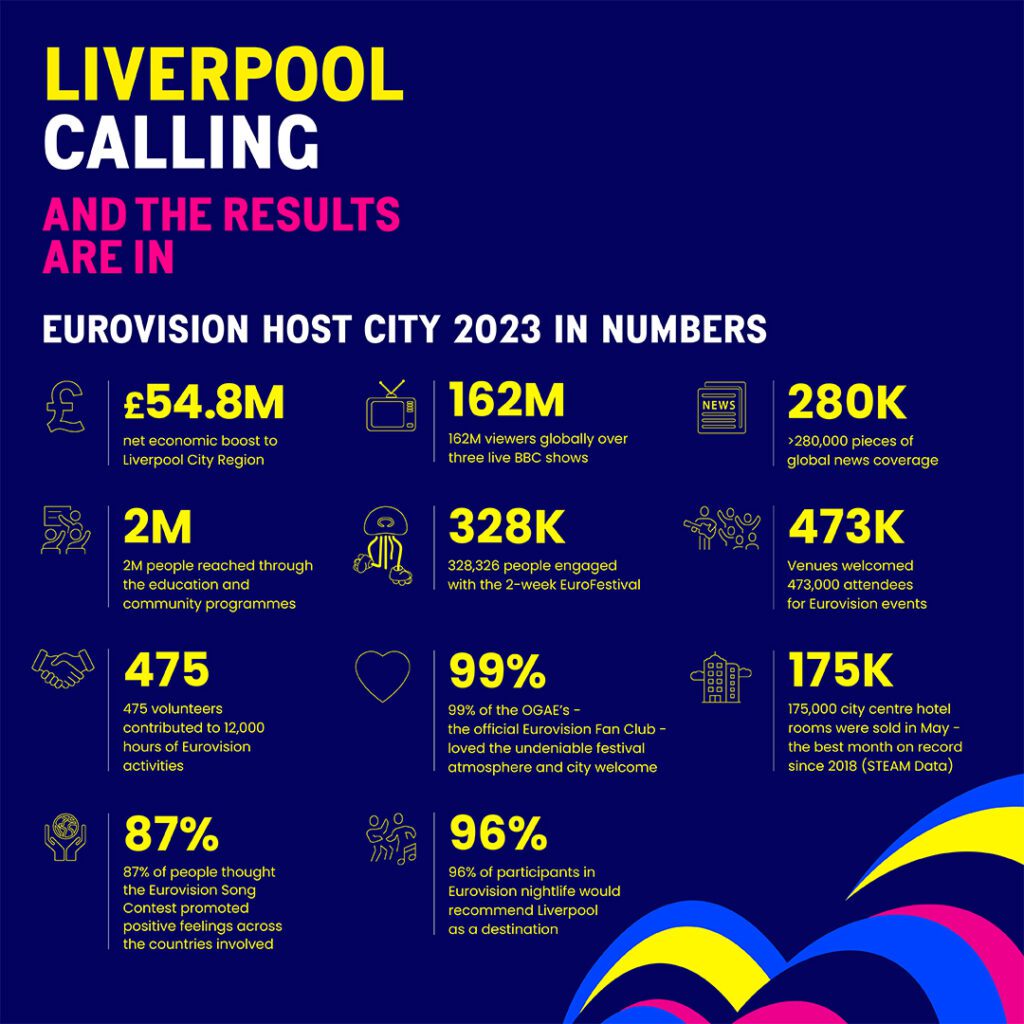LIVERPOOL’S HOSTING OF EUROVISION 2023 – ECONOMIC IMPACT REVEALED
Ground-breaking research has found that hosting the Eurovision Song Contest 2023 delivered a £54 million economic boost to the Liverpool City Region.

Crowds at the official Eurovision Village ©Liverpool City Council
In a first for any Eurovision Song Contest host city, a Multi-Agency Evaluation Steering Group led by Liverpool City Council, has commissioned five in-depth, independent evaluations – the interim results of which will be announced today (Thursday 26 October) by Leader of Liverpool City Council, Councillor Liam Robinson and Liverpool City Region Mayor, Steve Rotheram.
The reports looked at the economic and social impact of staging the event on behalf of Ukraine, as well as the influence on cultural relations; the impact on wellbeing in the city and the wider city region; the visitor experience and the effectiveness of the strategic collaboration between delivery agencies.

Key data highlights include:
The Big Numbers
- Eurovision boosted the Liverpool City Region economy by £54.8million (net) with restaurants, accommodation providers, shops, bars and transport networks all benefitting.
- In total 473,000 people attended Eurovision events in the city, with 306,000 additional visitors heading to Liverpool to be part of the celebrations.
- In May, 175,000 city centre hotel rooms were sold – the best month on record since 2018. (STEAM data)
Culture Counts
- The education and community programmes, EuroStreet and EuroLearn, engaged with 367 organisations and directly with 50,000 people, young and old. The overall programme is estimated to have reached 2 million people.
- EuroFestival – the Culture Liverpool curated two-week culture festival – presented 24 brand new commissions, 19 of which were in collaboration with Ukrainian artists. A huge 328,346 people engaged with this programme – 557 artists, 1,750 participants involved in a commission and an audience number of 326,039.
- The official Eurovision Village, located at the Pier Head attracted 250,000 visitors across the ten days it was open, with the ticketed final selling out within hours.
Visitor’s Views
- Visitors to Liverpool reported an overwhelmingly positive experience. In a survey, 89 per cent of those questioned, felt it was a safe event and 88 per cent praised its inclusivity. A whopping 96 per cent of those surveyed would recommend Liverpool as a destination to visit and 42 per cent of overseas visitors said the city’s staging of the event had a positive impact on how they viewed the UK.
- The official Eurovision Fan Club – the OGAEs – carried out a survey and found that 99 per cent of their members felt welcomed in the city and 98 per cent loved the undeniable festival atmosphere.
Resident’s Reaction
- There was a huge amount of pride around Liverpool being the host city, with 80 per cent of residents noting how important it was for Liverpool and a further 93 per cent saying they were pleased with how the city delivered the event.
- Of those questioned, 74 per cent were enthusiastic about Liverpool hosting on behalf of Ukraine and 71 per cent felt that the city’s leading role promoted positive feelings across all of the participating nations.
People Power
- An impressive 475 people provided 12,000 hours of volunteering, covering 350 shifts. The majority (90 per cent) were from the North West of England, and 30 were Ukrainian.
- A Eurovision job recruitment fair saw 394 jobs offered in one day.
- A partnership between the BBC and Liverpool Institute for Performing Arts saw 145 students become part of the Eurovision production – in roles such as on stage dancers in the live shows, costume makers or in the TV production team.
Read all about it
- Between the period of October 2022, when Liverpool was announced as host city, until end of May 2023, more than 280,000 pieces of global news coverage were generated.
- The three live BBC shows were watched by 162 million people.
Keep Liverpool Tidy
- More than 50,000 tonnes of waste was collected throughout the Eurovision period, 80 per cent of which could be recycled.
The independent reports were:
- Economic Impact – Commissioned by Liverpool City Region Combined Authority and funded by Arts and Humanities Research Council. The research was compiled by AMION Consulting.
- Community and Wellbeing – Commissioned by Liverpool City Council and funded by Spirit of 2012 and the Department of Culture, Media and Sport (DCMS). The research was carried out by University of Liverpool.
- Cultural Diplomacy – Commissioned by Liverpool City Council and funded by British Council and DCMS. The British Council led on the research along with the University of Hull, and consultants from Universities of Brighton, Southampton and Royal Holloway (University of London).
- Nightlife – Funded and compiled by Liverpool John Moores University.
- Multi–Agency Working – Led by Edge Hill University.
Along with these reports, the BBC has commissioned its own post-show report.
To bring together the findings of the reports, Liverpool City Council’s Public Health team commissioned The Heseltine Institute for Public Policy, Practice and Place to compile the headline findings. This comprehensive overview can be found at the Heseltine Institute website.
The interim findings of these reports will be discussed at a special one-day Eurovision event taking place at ACC Liverpool today (Thursday 26 October).
Head to the official Liverpool Calling website for full details of the day which will include panels with the Liverpool Host City team who will give an insight into the complexities of staging an event of this scale. This is a Liverpool City Council event supported by the Liverpool BID Company and The ACC Liverpool Group.
Follow @CultureLpool on Twitter (X), @CultureLiverpool on Facebook and @culture_liverpool on Instagram for the latest updates as well as using #LiverpoolCalling on social media.

